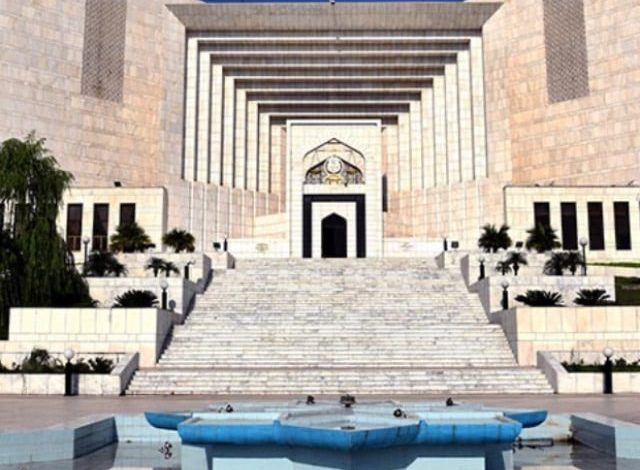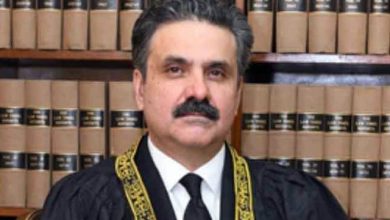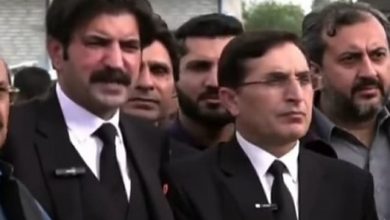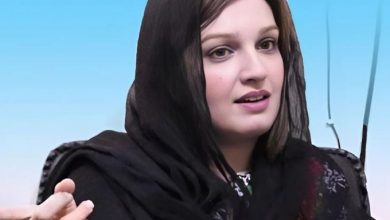SC questions how PTI got election symbol in 2018 without intra-party polls

Justice Jamal Mandokhail has inquired as to how the Pakistan Tehreek-e-Insaf received an election symbol in 2018 despite not having conducting intra-party polls at that time.
The question was raised on Monday during the Supreme Court (SC) hearing over the Sunni Ittehad Council’s (SIC) appeal against an ECP decision not to allocate reserved seats to it in the national and provincial legislatures.
Chief Justice of Pakistan Justice Qazi Faez Isa, who leads the 13-member full bench, responded to Justice Mandokhail by stating that indulging into the past matter would also bring the Senate Chairman’s election into question.
Earlier during the hearing, the lawyer for the Election Commission of Pakistan (ECP) presented four legal arguments, stating that the Pakistan Tehreek-e-Insaf (PTI) had not conducted intra-party elections according to the law.
He argued that Barrister Gohar’s signature as a chairman on PTI tickets was invalid as there was no legal PTI organisation at the time.
The party ticket bears the signature of Barrister Gohar as Chairman.
At the time of issuing the ticket, Tehreek-e-Insaf did not have a legal organizational structure.
The party’s organization did not exist due to the failure to conduct proper intra-party elections.
Justice Mandokhail pointed out that the party tickets were issued on December 22, while the intra-party elections case decision came on January 13, during which Barrister Gohar was the Chairman.
The ECP’s counsel, Sikander Bashir Mohmand mentioned that the ECP had nullified the intra-party elections on December 23.
Justice Mansoor Ali Shah noted that the ECP’s decision was suspended on December 26, while Justice Jamal Mandokhail asked for clarification on where and by whom the mistake was made.
Counsel Sikandar Mehmood explained that many candidates did not mention their party affiliation, which is why they were considered independent.
Justice Jamal Mandokhail emphasized that the crucial element is the party ticket; without it, a candidate will be considered independent.
The Election Commission’s lawyer agreed, stating that he and the Justice were on the same page.
Justice Mandokhail responded, “Tear the page, I don’t want to be on the same page.”
The lawyer argued that the party tickets issued by Barrister Gohar held no legal status.
Sahebzada Hamid Raza, Chairman of the Sunni Ittehad Council, could have issued party tickets but did not.
Raza had submitted PTI’s party ticket with his nomination papers, although he mentioned his affiliation with the SIC, allied with PTI.
Justice Hassan Azhar Rizvi highlighted that the returning officer had accepted Raza’s papers. The ECP’s lawyer clarified that Raza had submitted a declaration for PTI Ideological.
Justice Shahid Waheed inquired if Raza was asked for clarification before being declared independent.
The lawyer responded that Raza had requested the shuttlecock symbol and submitted PTI’s party ticket.
Justice Munib Akhtar questioned the relevance of intra-party elections, while Justice Ayesha Malik noted that this situation would disturb the election schedule.
The court inquired under which law PTI deserved special treatment.
CJP Isa remarked that the PTI election issue had been pending with the election commission for years.
Justice Akhtar noted that the issue was about the legality of the elections, not their occurrence.
The lawyer mentioned that under Article 218(3), the PTI could be granted leniency, but Kanwal Shauzab’s petition was inadmissible as she was not an affected party.
Lawyer Mohmand added that PTI members were not part of the SIC.
Justice Yahya Afridi stated that six candidates were declared independent by the ECP.
Justice Mansoor Ali Shah asked if PTI candidates could be given three days to join the party, which the lawyer deemed impossible.
Justice Athar Minallah pointed out that no party registration was cancelled by the Supreme Court’s decision.
Lawyer Kamran Murtaza supported the ECP, noting a “printing error” that confused minority representation.
After the ECP’s arguments, PTI Chairperson Barrister Gohar took the stand, stating that he had submitted both party and independent nomination papers, and accused the ECP of hiding documents from the court.
Assistant lawyer Kamran Murtaza stated that JUI-F agreed with the ECP’s arguments.
PPP’s lawyer Shehzad Shaukat adopted the arguments of Makhdoom Ali Khan. Kamran Murtaza clarified that there was a misunderstanding regarding minority representation in the party.
Justice Mandokhail questioned the election commission’s correctness, and Murtaza confirmed their support for the constitutional institution.
PML-N’s Barrister Haris Azmat submitted written arguments to the court.
The reserved seats case
The ECP on December 22, 2023 stripped the PTI of its election symbol in view of irregularities in its intra-party polls.
The Supreme Court on January 13 upheld the ECP order, forcing the PTI candidates to contest the February 8 general elections as independents.
These independent returned candidates joined the SIC after the announcement of official election results. The SIC later sought reserved seats in the parliament and provincial assemblies in proportion to its general seats.
However, the ECP on March 1 refused to allot these reserved seats to the SIC and allocated additional reserved seats to other political parties. The Peshawar High Court (PHC) on March 25 also upheld the ECP order, prompting the SIC to approach the apex court.
At the last hearing of the case, the ECP’s counsel had presented a summary of the nomination papers submitted by the PTI-backed independent candidates prior to the polls.
Commenting on the summary, one of the bench members Naeem Akhtar Afghan-has noted that 35 of the 81 PTI-backed returned candidates did not disclose their affiliation with the PTI in the nomination papers.




